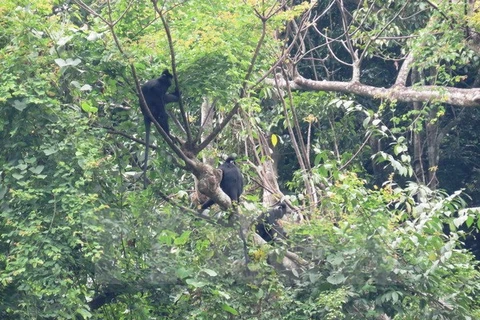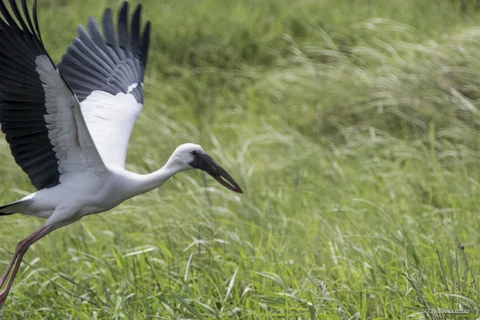Dien Bien (VNA) – Hundreds of Asian openbill storks, which are listed as an especially rare species in Vietnam’s Red Book, are making their home at the historical relic site of Dien Bien Phu battlefield this season, greatly delighting tourists.
Around 300-400 birds can be seen in the garden of the Command Tunnel of General de Castries.
According to head of the tunnel relic management group Luu Van Tung, the birds migrate to the site every March and April for several years now, but their number surges this year.
Most of the storks are living in hills in Tan Thanh, Muong Thanh and Ta Lenh communes of Dien Bien Phu city, and Pu Nhi commune in Dien Bien Dong district.
The heavy, gentle storks are an easy target as they feed in the rice fields, rivers and lakes.
The storks inhabit South and Southeast Asian countries including India, Sri Lanka, Nepal, Myanmar, Thailand, Laos, Cambodia and Vietnam.
In Vietnam, the storks are known under the name co nhan (swallow) or co oc (snail storks) since they mainly eat snails. They also eat frogs, crabs, large insects and other small living things. They are mostly seen in the country’s southwestern region.
According to the Vietnam Association for the Conservation of Nature and Environment, the number of storks has decreased sharply over the past few years, putting them on the verge of extinction.
The Dien Bien provincial People’s Committee has urged its localities and agencies to intensify measures to protect the rare storks.
In its document dispatched on May 11, the committee asked Dien Bien Phu city and districts to steer their communes and offices to safeguard openbill storks and wild animals by encouraging locals not to hunt for and keep them illegally and not to use wildlife products.
The transport, slaughter and trading of endangered animals and birds, particularly Asian openbill storks, are prohibited.-VNA

























